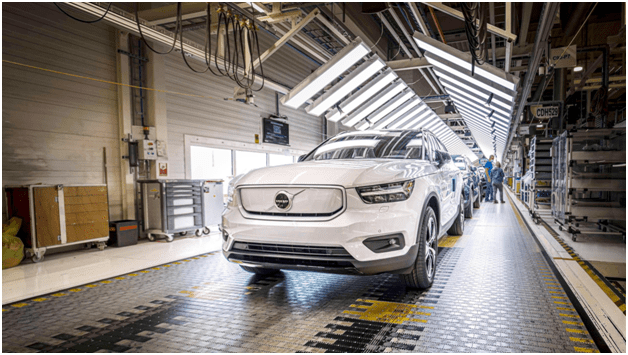Volvo is hoping to be a significant part of the EV revolution. It targets to convert 50% of its global sales to electric by 2025. Volvo has introduced its XC40 recharge which will be the first among several upcoming fully electric cars. Volvo has started the production of XC 40 recharge at its Ghent, Belgium production plant and the first batch is ready for delivery in Europe.
The XC 40 recharge is the electrified version of Volvo’s most sold SUV. It is Volvo’s first vehicle to win the prestigious European Car of the year award. The Car is based on the Compact Modular Architecture (CMA), which is an advanced vehicle platform co-developed within the Geely group. It has a 78Kwh battery pack that was developed by LG Chem and CATL. The battery can be charged to 80% in just 40 min with a 150kw charging system. The dual-motor AWD puts out 408hp combined. The 660N-m torque takes the XC40 from 0-60 in just 4.7sec. While all the big players are trying to chase Tesla (https://honkyroad.com/will-tesla-dominate-the-next-decade-or-are-there-challengers/), Volvo says that tens and thousands of customers have shown keen interest in XC40 recharge.
Volvo has not announced any of the upcoming cars but has come a long way in commercial vehicle electrification. Volvo offers a complete e-mobility solution on the European market, it includes everything from electric busses to charging infrastructure and its implementation.
Volvo is constantly innovating and testing new technologies to improve e-mobility. Volvo’s new e-mobility solution includes connected zone management services and electric buses with advanced safety technologies, helping cities towards zero accidents in city traffic
The Volvo Group has been carrying out research into autonomous vehicles and transport systems for several years. They have developed several prototypes of self-driving concept vehicles that can be used in restricted areas like mines and ports.
- In 2016 the group demonstrated a self-drive truck, the Volvo FMX, in the Kristineberg Mine in northern Sweden.
- In 2017 the group presented a self-drive refuge truck that can be used in an urban environment.
- In 2018 they signed an agreement with Brønnøy Kalk AS in Norway to provide its first fully autonomous solution for transporting limestone from an open-pit mine to a nearby port.
- Volvo demonstrated a prototype of a 12-meter autonomous bus.
It is not just cars or busses, Volvo group has even developed fully electric construction equipment. Surprisingly, they are not just prototypes. They have launched Volvo EC25 excavator and Volvo L25 wheel loader that are available for pre-booking. The production is about to start in late 2020. The ECR 25 has a runtime of 4 hours in a single charge and the L25 can run for 8 hours.
The group in 2019 partnered with NVIDIA to jointly develop decision-making systems for autonomous vehicles. The partnership with NVIDIA will focus on the development of a flexible, scalable Autonomous Driving System, which is planned to be used first in commercial pilots and later in commercial offerings from the Volvo Group. The strategic partnership covers end-to-end computing fundamentals to autonomous vehicles.
Volvo group with a wide category of automotive products will surely be part of the green revolution in the auto industry. Volvo cars might have to go a long way when compared to its competitors like Tesla and GM but Volvo trucks and busses are leading in the category when it comes to e-mobility and automation.






















